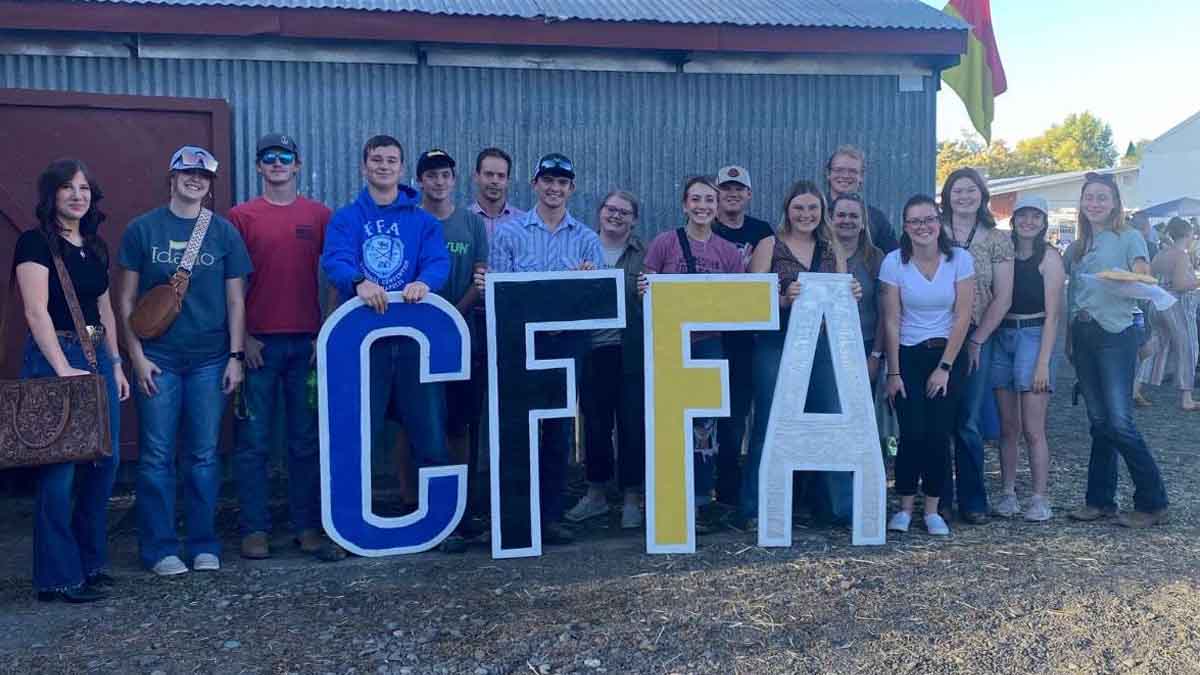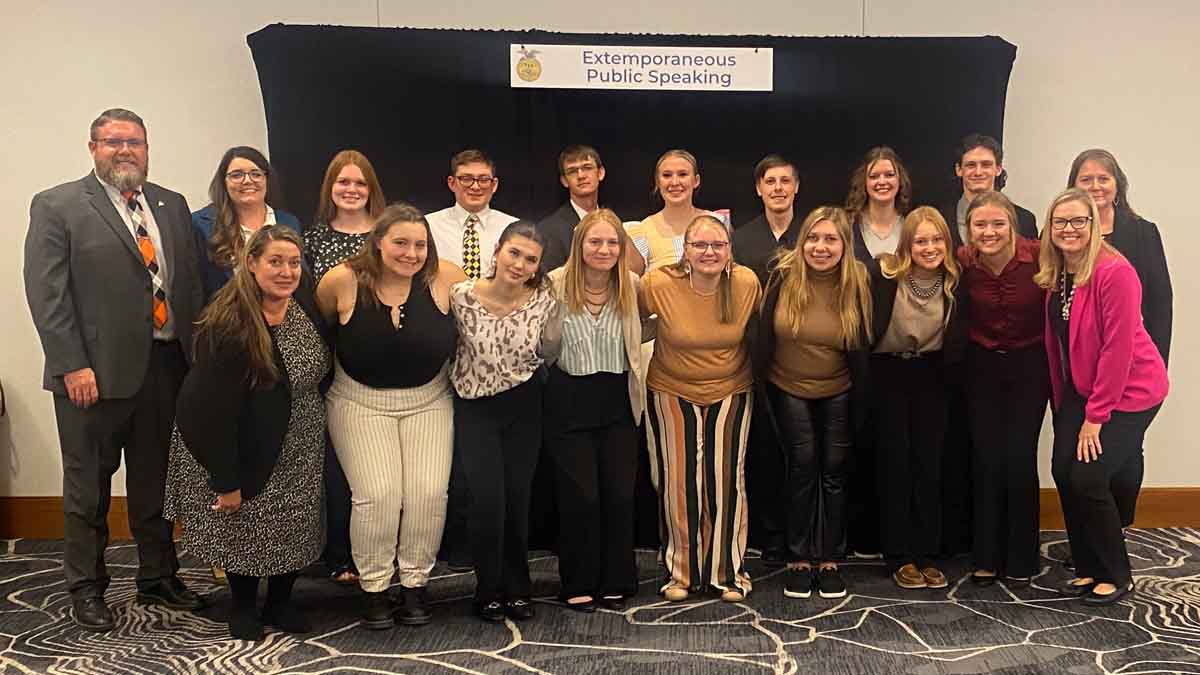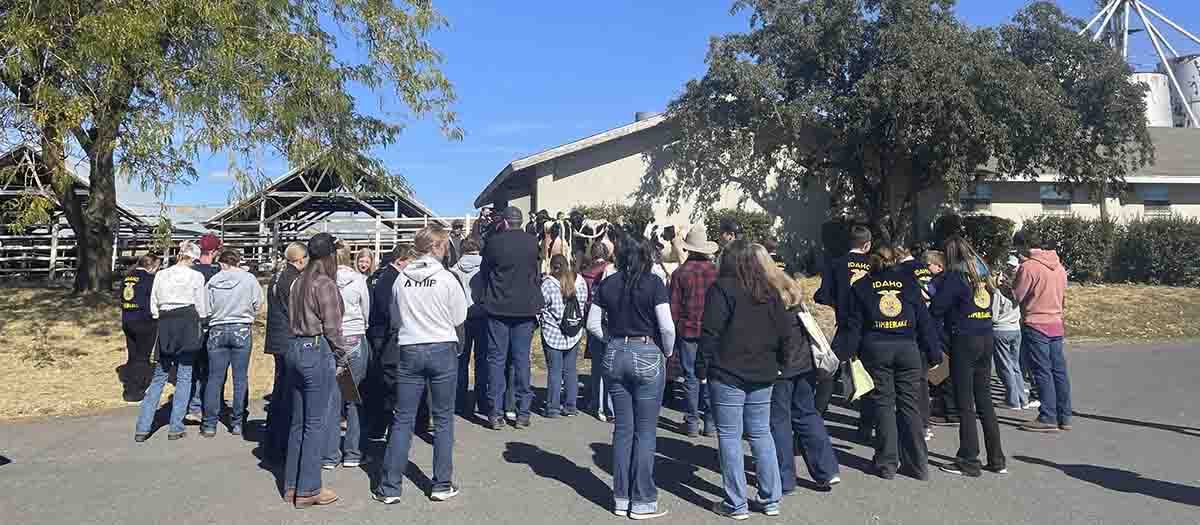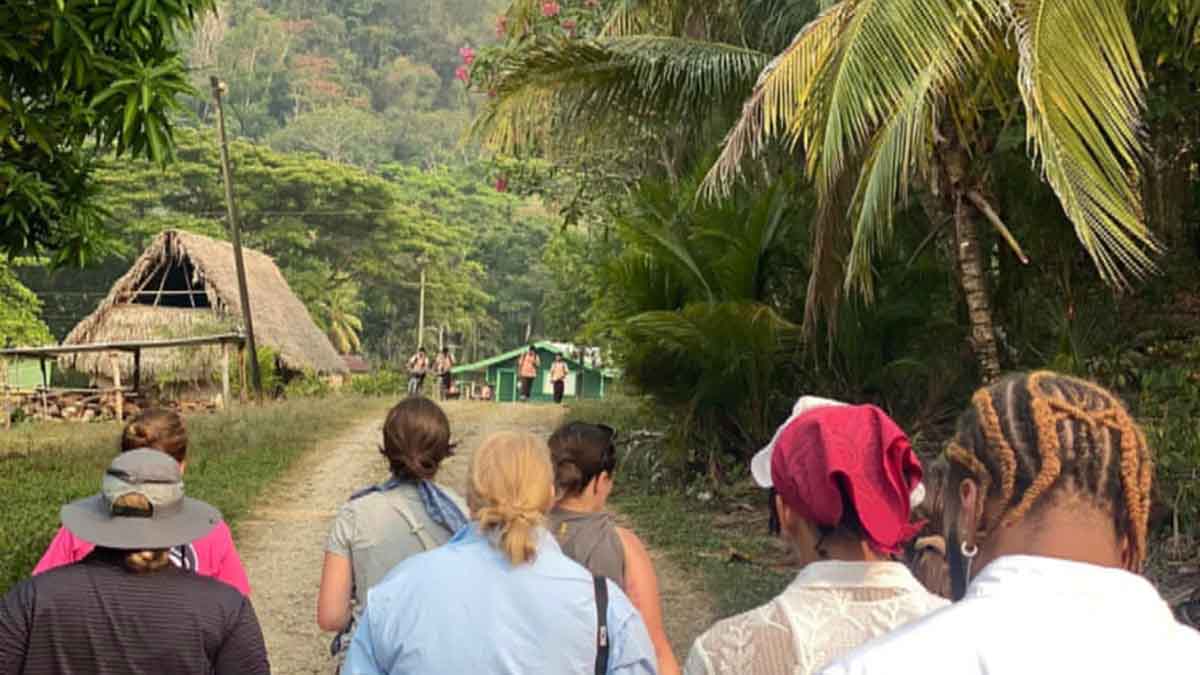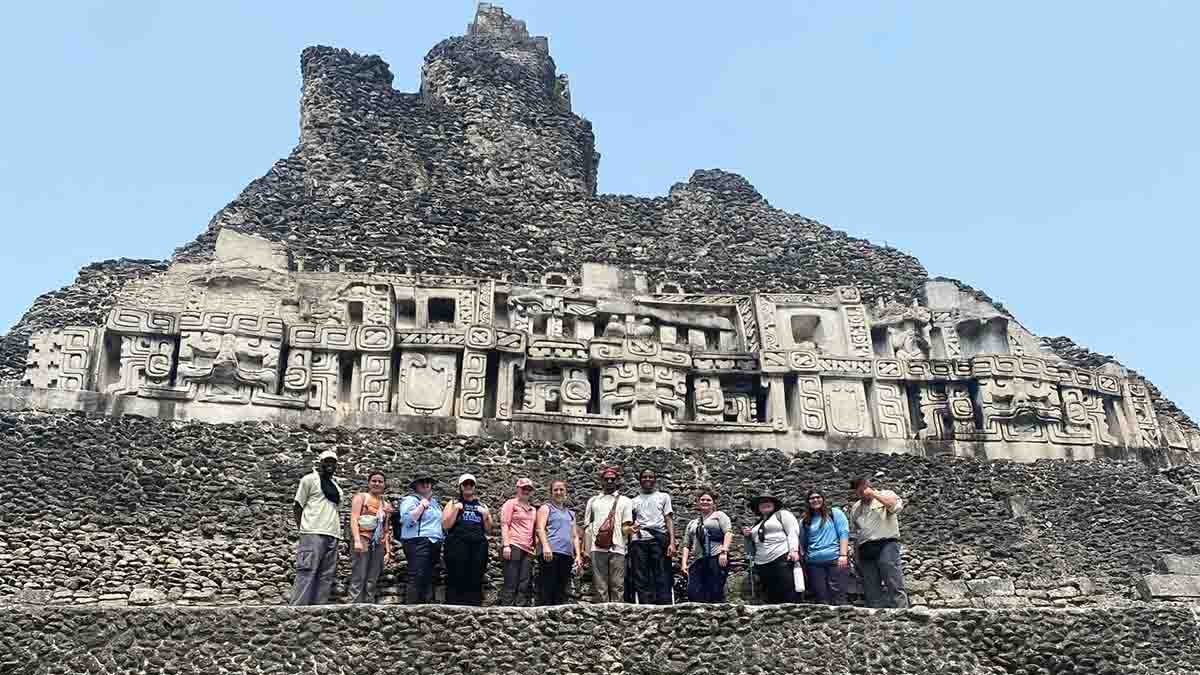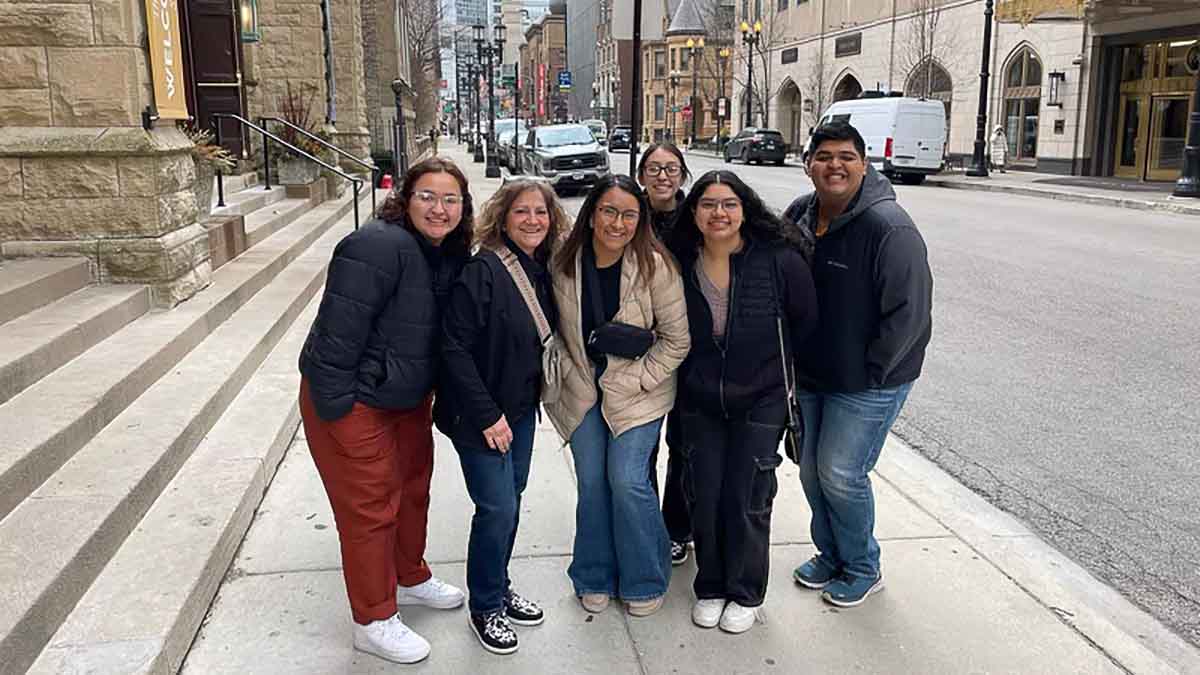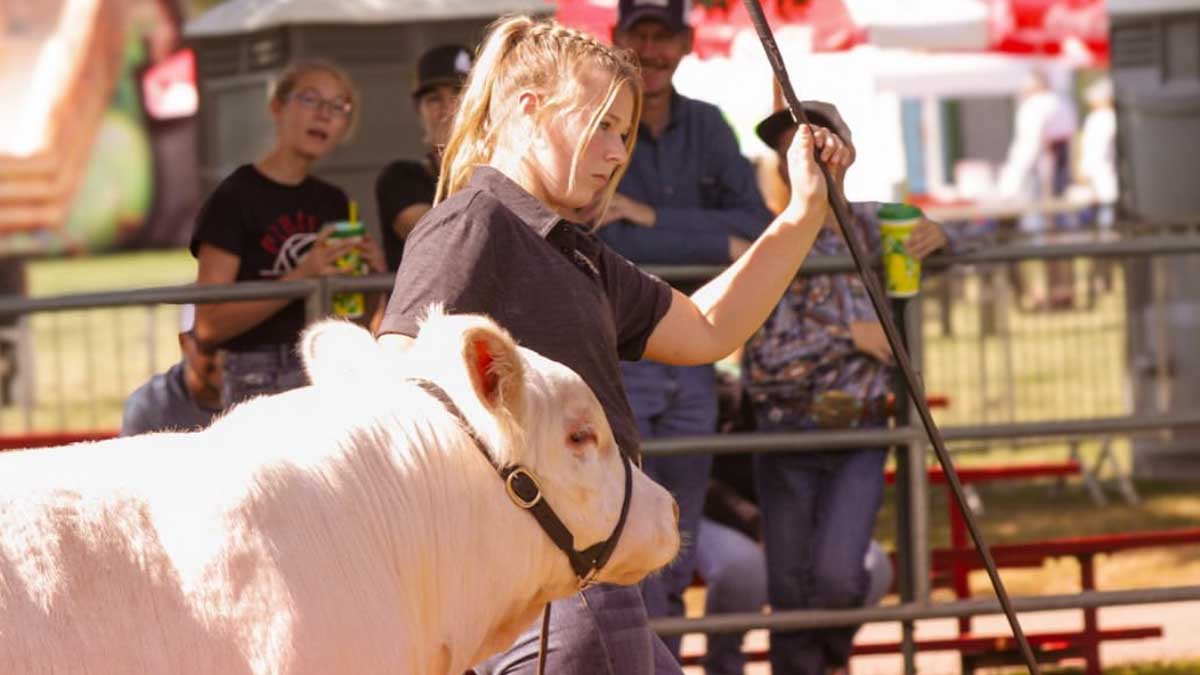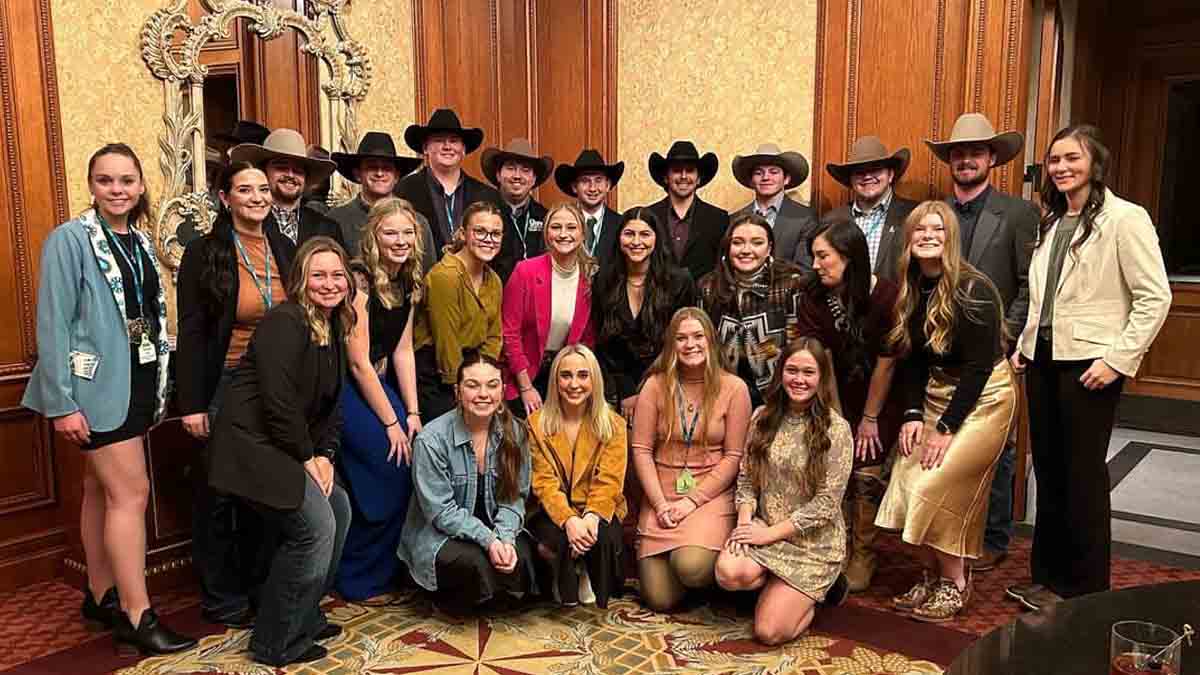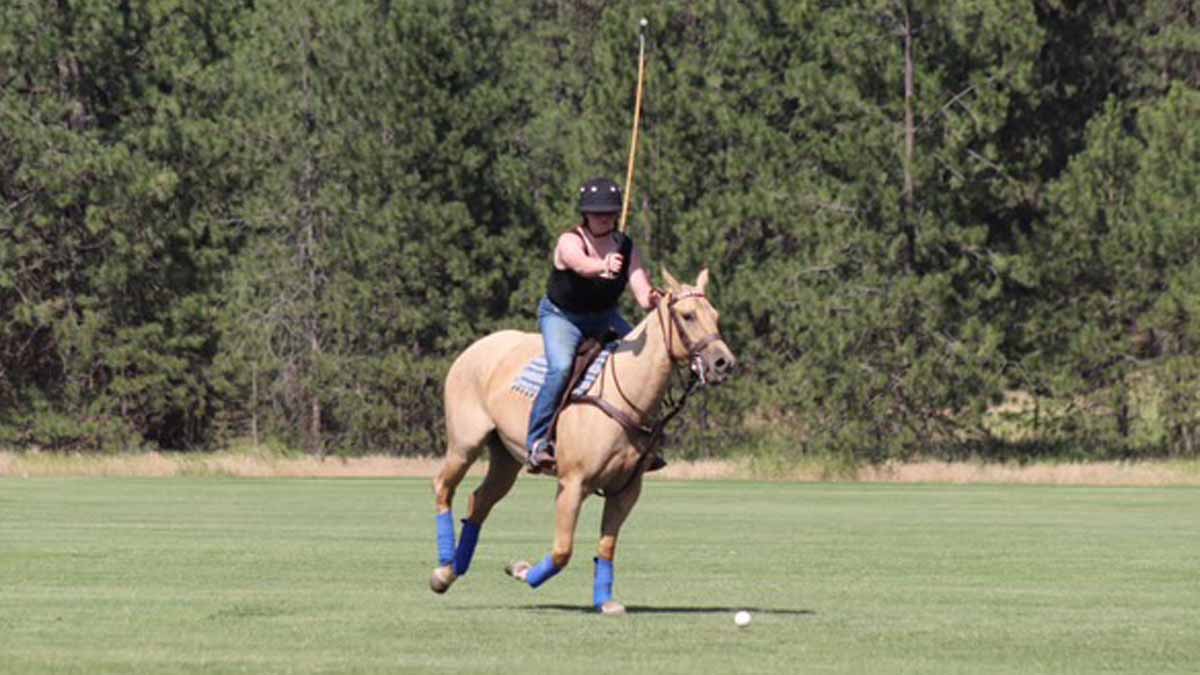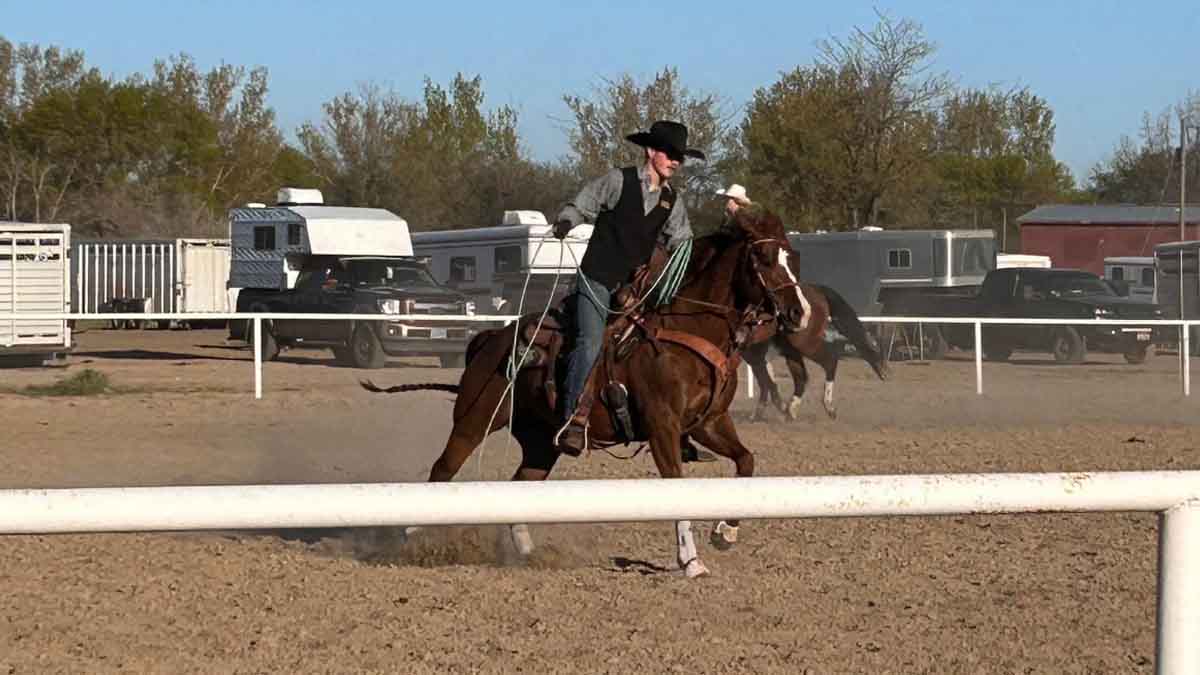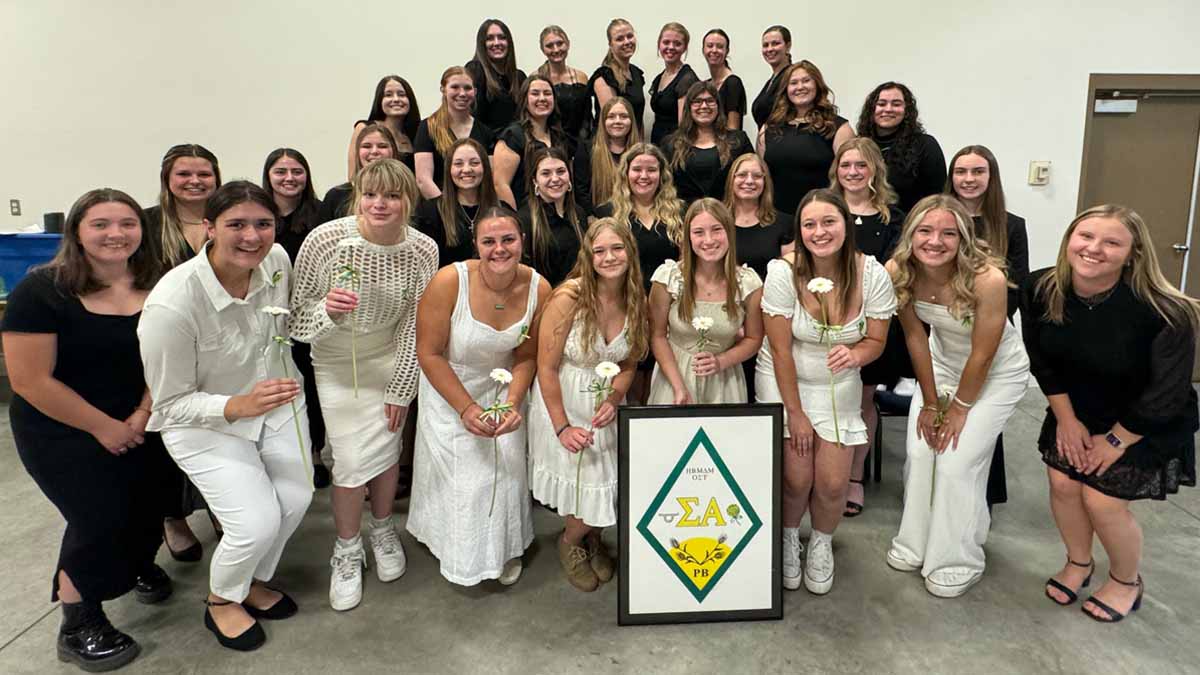The Hoot, Fall 2024
Letter from the Faculty
Hello AELC alumni and friends. As the fall season sets in, we are pleased to say that both our hearts and department are full. Over the last few months, we have worked to bring the right people into the right positions to accomplish our purpose. Our department is stronger than ever, with a full contingent of dedicated, talented and student-focused faculty. It has been fulfilling to be part of the department at a time when we have added three faculty and a new executive FFA director. Garrett Brogan joined the department in September as our new ASCL (agricultural sciences, leadership and communications) faculty. Brogan is a native of Idaho and will be a tremendous asset as we grow the ASCL major. He will also become the faculty liaison for the Ag Comm Squad who work tirelessly to ensure we share the great things the department is working on, while building their personal communications portfolios. You may have caught some of their “Tuesday Trends” which are a hit with the younger crew. It is heartening to see the growth and reach of this group.
Melissa Sherman joined the department as the new Idaho FFA executive director in early June, bringing a wealth of experience and vision to the position. Melissa was an agricultural educator at Vallivue High School for eight years and the executive director at Destination Caldwell for three years. She facilitated meaningful experiences for the state officers this past summer and transitioned smoothly into this challenging position. We are grateful to continue to offer students a diverse array of high-impact experiences this year including assisting with National FFA Convention, attending the World Food Prize Borlaug Dialogue, instructing during Teach Ag Day, completing meaningful industry internships and coordinating events across CALS. These experiences will enhance their abilities to connect humans to agriculture and ensure that Vandals are on the forefront of whatever fields they choose to enter. We would like to thank each of you for the support you have provided to our department over this past year. Go Vandals!
By the Numbers
- 86,964 miles traveled for high-impact experiences
- $1.7 million dollars in external funding
- 32 publications by faculty and staff in 2024
- 5 faculty
- 3 staff
- 110 undergraduate students
- 12 graduate students
History Throwback
by Gracie Swope
Keeping track of agricultural educators can be a challenging task. Today, the Idaho Agriculture Teachers’ Association (IATA) has an online directory to manage teacher contact information. The directory connects agricultural educators, FFA advisors and professionals involved in agricultural education statewide. The directory serves as a resource for networking, sharing best practices and accessing information related to agricultural education programs. Users can find contacts for collaboration, professional development opportunities and resources to enhance their teaching and outreach efforts in agriculture. Before this online resource, the IATA kept physical records with the agriculture teacher's record card. These cards were essential for documenting student progress and achievements in agricultural education programs statewide. The cards also frequently included teaching experience, education and agricultural background. Teacher record cards were used from the 1920s into the early 2000s to track agricultural educator background, placement and skills in Idaho. This information is now available on the IATA website. The AELC department is proud to highlight the rich history of how agriculture has developed in Idaho and the story of our department.
CFFA Corner
by Sage Cochrane
Collegiate FFA Helps Students Succeed — The Collegiate FFA (CFFA) officer team is always looking for individuals with a passion for educating others about agriculture. We consistently have quality students from across the campus join our events, and after a successful election season, we welcomed a full team of dedicated officers eager to serve as an asset to the organization.
As CFFA officers, we work to leverage knowledge and enthusiasm to inspire FFA students within the community. With many new members joining CFFA this year, we are committed to instilling values of community service and strong leadership. CFFA members meet biweekly, often engaging in service projects or competitions. One of our flagship events is the Teach Ag Championship, where students compete in activities to demonstrate their skills. Members have worked on speaking events, multiple career development events and even trailer driving as a way to demonstrate their skills.
This semester, one of our main community-focused activities was the “Soup-erbowl,” an event that encouraged students to donate canned goods for local food banks. Connecting with a common theme of promoting agriculture helps us create an atmosphere of joy and camaraderie at our events and hopefully creates a welcoming environment where students can find a home away from home on campus. These activities offer invaluable experiences that prepare students for the future, fostering skills they can carry forward into their careers. CFFA not only cultivates leadership but also demonstrates to students how they can lead both within the campus community and beyond. Whether members were involved in FFA during high school or are simply passionate about giving back to the community, CFFA provides a space where anyone with an interest in agriculture can connect, grow and make a difference.



Cultivating the Future
by Jenna Whitaker — CALS Days: A Legacy of Learning By Doing — As the vibrant colors of fall began to cover Moscow, over 300 high school students from across the Pacific Northwest traveled to U of I. The College of Agricultural and Life Sciences (CALS) opened doors to students, families and educators for the annual CALS Days event. This event is a hallmark of fall, and has now brought generations of students to campus to see what their future as a Vandal might hold. CALS Days showcased the college’s diverse programs and introduced students to what it means to be a Vandal. Students engaged in a variety of interactive workshops, career development events and completed tours of campus facilities. Future Vandals also experienced a Vandal football game and tailgated with CALS faculty and staff. CALS Days is not just a benefit for visiting students — it also provides experiences for those who help organize it. Students from the AELC department helped facilitate this event, strengthening skills while inspiring the next generation of agriculturalists.
AELC students provided support to university faculty and staff throughout the weekend. Liz Shaw, a senior studying ASCL, spent Saturday evening eating dinner and ice skating with students. She said that this experience was an excellent opportunity to apply the leadership and communication skills she has been developing in her classes. Madi Rudner, a junior studying agricultural education, took on the responsibility of supervising students by spending the night with them at Moscow High School. When asked how the skills she learned applied to her degree, Rudner said the experience “taught me you need to have trust in your kids and yourself when doing overnight trips.”
As the event concluded, high school and middle school students left with not only new knowledge and experiences but also a sense of community and connection that will resonate long after they return home. AELC students gained skills and were able to put their leadership skills to the test. Both high school and U of I students embraced a weekend of “doing to learn.” With its commitment to fostering the next generation of agricultural leaders, CALS Days continues to be a success, ensuring the legacy of the U of I and the Vandal spirit live on.
by Alyvia Moffis — Extending Opportunities Through Extension — University of Idaho Extension is a vital service that bridges the gap between agricultural research and practice, helping farmers enhance productivity, sustainability and resilience. UI Extension help farmers adopt innovative approaches. They provide information, tools and support in areas like water management, horticulture, health, forestry and food production, improving citizens quality of life. Extension also facilitates the 4-H youth development program and community development programs, producing a new generation of knowledgeable agricultural leaders. To meet demands in the state, U of I provides a number of UI Extension programs, many with ties to the AELC department. Alumni and current students serve as a bridge between the past and present, carrying forward the traditions and values instilled during their time in school. AELC students often find themselves working in Extension following graduation, or like sophomore Kenzie Barta, completing summer internships with UI Extension offices throughout Idaho. Barta's UI Extension, Latah County internship through AmeriCorps in summer 2024 was her introduction to working in UI Extension. Barta's goal was to assist in educating youth about agriculture and STEM. There wasn't much that Barta didn't assist with, including making lesson plans, running classes and activities, gathering information for reports and supporting camps and events. Barta gained insight from her internship and examined Extension as a potential career.
“I plan to use what I have learned to help teach all ages about agriculture, explore Extension opportunities and apply professional and personal skills,” she said.
Barta loved making an impact on youth and found it rewarding to see kids leave programming with smiles on their faces. She knows agricultural education is crucial so that future generations understand where their food and fiber comes from and can support practical and sustainable farming practices.
Klae O'Brien, a U of I graduate, worked in private industry before becoming the educator for UI Extension, Lewis County in February 2024. She gained academic, writing and communication skills through her studies in the AELC department. O’Brien served as a member of the Ag Comm Squad, improving her writing and social media skills and participated in undergraduate research for exposure to research and professional writing. These tasks better prepared her for completing her master’s degree within the department.
“I love having a fast paced job that directly benefits the community,” she said. “I work with local farmers, businesses and youth and get to be involved with a close-knit community. One day I am helping tag animals for the Lewis County Fair, the next I am in the field with farmers talking about soil health and crop yields and the next I am working with industry partners to plan collaborative programming.”
O'Brien's passion for community engagement and agriculture drives her success in the Extension role where each day she experiences new challenges and has the opportunity to make a difference. Her commitment to support local farmers, businesses and youth ensures that Lewis County continues to thrive and grow. UI Extension is essential for promoting sustainable agricultural practices and enhancing communities around Idaho. U of I exemplifies this role through its widespread Extension programs, which provide valuable resources and support to the agricultural community. We are proud of AELC alumni and current students who invest their time in Extension services.
by Hadley MacConnell — You Better “Belize” It — Students Teach Across the Globe — Being a Vandal offers unparalleled opportunities for students in the AELC department to widen their perspectives through high-impact experiences. One of these experiences is the Global Orientation to Agricultural Learning (GOALs) program, funded by a USDA National Institute of Food and Agriculture Higher Education Challenge Grant and coordinated by faculty member Kasee Smith. The program completed its third cohort in June 2024, which brought the first time GOALs participants could travel abroad. The GOALs program is a year-long initiative which includes fall and spring courses along with three immersions — the World Food Prize Borlaug Dialogues, teaching in a domestic school during spring break and, new for the 2024 cohort, an international teaching immersion in Belize. Six U of I students joined a cohort of 18 total students including students from Penn State and the 1890’s Land Grant Universities. This program encourages students to engage with global agricultural issues, preparing them to become educators and advocates of agriculture. After returning from her spring break immersion, GOALs cohort three member Caylie Browne said, “It was impactful to teach students about global agriculture. I went to Wayne High School in Utah. The teacher there, Jessica Grundy, was phenomenal. She gave excellent feedback after I taught my lessons. I was able to gain so many new ‘teacher tricks.’ I definitely feel more prepared as a teacher because of the program.”
Students in the 2023-2024 GOALs program were the first to gain an international experience in Belize. The group focused on teaching high school students in a partnership with Independence Junior College, and connected with students in Laguna Village and at Tumil’kin Agriculture High School. The Belize immersion also included examining Belizean culture, smallholder farm tours, a night experience at the Belize Zoo, and the chance to connect with literacy experts through the Belize public school system. Cohort three member Saydee Henning said, “My experience during the Belize immersion gave me an opportunity to see how another country views and produces in agriculture. I connected with students and learned the value of education in the lives of all people.”
U of I and the AELC department take pride in offering students opportunities to deepen their understanding of the world and use the knowledge they obtain to make a difference in the future. GOALs alumni from the first two cohorts are teaching in Idaho and are already exposing their students to a global perspective. The GOALs program continues in 2024-2025 with the fourth cohort. The U of I students selected this year are Cody Carlon, Hans Miles, Fernando Montelongo, Madi Rudner, Mackenzie Serrano and Madi Weber. They are already working diligently to prepare for their adventures. We look forward to seeing how the GOALs students will integrate their knowledge and experiences to grow as impactful agricultural educators and advocates for agriculture across the world.



Why should students participate in clubs? To connect with other CALS students and open your horizon for your future.CALSAC President Grace Orella
by Sage Cochrane — In the Club — AELC Students Expand Learning — Students in the AELC department have unique opportunities to deepen their agricultural knowledge, both academically and through hands-on experience. Being involved in student clubs through CALS is one way many AELC students expand their learning. Collegiate FFA is a club housed within the department, but it is not the only club AELC students participate in. Grace Orella, a junior majoring in agricultural education serves as the current president for the CALS Student Affairs Council (CALSAC) which helps coordinate all student activities through the college. We asked AELC students to share their experience through their involvement.
MANRRS — For those interested in broader agricultural and leadership roles, the Minorities in Agriculture, Natural Resources and Related Sciences club (MANRRS) offers personal and professional growth. Ab Suarez, a sophomore in agricultural education said, “MANRRS opened my eyes to career options within my major.”
Block and Bridle — Block and Bridle is a club dedicated to promoting the improvement of animal agriculture and to bring about closer relationships among those pursuing some phase of animal agriculture. Sophomore Kenzie Barta said, “Block and Bridle has given me lifelong friends and valuable connections with university staff.”
SICA — The Student Idaho Cattle Association (SICA) connects students to the Idaho Cattle Association, offering networking with industry professionals. Ellie Tesnohlidek said, “SICA helped me build my network in the cattle industry and refine my knowledge of the industry.”
Polo Team — Polo allows experienced and new riders to engage in the sport, building connections with players and professionals. Students gain skills in a competitive environment on horses provided through the university. Morgan Stubbs, a polo player, says, “Joining polo helped me continue my passion for riding in college.”
U of I Rodeo — Rodeo Club offers another competitive outlet, allowing students to learn rodeo events and connect with others as they compete throughout the region. Brody Wallace, a sophomore majoring in agricultural education, recommends it for those who want to combine learning with friendly competition.
Sigma Alpha — Sigma Alpha, a professional agricultural sorority, helps women in agriculture cultivate leadership and network with others in their field. Sage Cochrane, a freshman majoring in agricultural education said, “Sigma Alpha has helped me grow as a strong female advocate for agriculture.”






by Hannah Stolfus and Madi Passmore — Building the Future through Agricultural Communications — Have you ever wondered how the AELC department coordinates social media or the creation of The Hoot newsletter? AELC is built on the principle that students should learn by doing. To facilitate this mission, the department created a group of students who work tirelessly to promote the communications initiatives of AELC. The Ag Comm Squad is comprised of students from both the agricultural education major and the agricultural science, communication and leadership major who work together to produce content for the department’s audiences.
A selection process occurs before each semester. To be selected as a member of the Ag Comm Squad, students submit an application and complete an interview process. Returning members are selected to serve as student directors of the group, and hired through the department to guide the student initiatives for the semester. The application or renewal cycle happens every semester, allowing students to choose how long they want to engage in the experience.
Students on the Ag Comm Squad can obtain course credits toward their respective majors, up to three credits per semester. This curated environment allows students to experience communications in a real-world setting. There are weekly meetings to discuss content and analyze performance data, weekly plans, campaigns and lessons. Team members work with deadlines, communication skills and extensive time management expertise is needed in the fast-paced and time-driven communication industry.
This program allows students to further their personal and professional growth during their time at U of I. Ag Comm Squad instruction allows students to improve writing, editing and camera filming skills. The team works together in teams on various projects including building social media content, departmental announcements and outreach materials. Each member also has a responsibility to complete a component of The Hoot. Ultimately, Ag Comm Squad team members gain practical skills through opportunities to build their portfolio and hone their skills, helping them with their time in school and after graduation.
There are tangible benefits to having a Ag Comm Squad including personalized social media content. For both the fall and spring semesters, the Ag Comm Squad develops a content creation plan. Students narrow ideas down to five subjects, one per weekday. This semester Ag Comm Squad posts include student spotlights, Tuesday trendsetters, an ag-agenda, where’s Joe now and alumni spotlights. Content is continually evolving to meet the needs of stakeholders. This keeps the AELC department social media more up-to-date with things that students will engage with while also having content that parents and alumni will appreciate.
Ag Comm Squad doesn’t happen only through the efforts of students. Kasee Smith and Garrett Brogan both take an active role in coordinating the group, with these roles transitioning to Brogan in upcoming semesters. In addition to faculty, both Sarah Swenson and Amy Calabretta provide time and resources to help the group succeed. As a team, we are incredibly grateful for their insight and support, which helps push us to learn more and be their best. Ag Comm Squad also includes student leaders in the form of student directors.
This year Hannah Stolfus and Madi Passmore are co-coordinating Ag Comm Squad. They are in charge of planning meetings, editing content, helping with project initiation and creating schedules for the group. These student leadership positions allow an opportunity to be engaged in a high-impact experience while managing a team. The practical skills gained in this role have big benefits to industry. Last year’s Ag Comm Squad student director, Hannah Ruth Pettyjohn, graduated and took a role at Lewis Clark State College as a public information officer.
Ag Comm Squad is a program meant to facilitate a space of creative thinking, skill development and a passion for continued learning. You might have wondered who creates your newsletters and social media content — it is our dedicated and driven students who want to bring you the best. The department and the Ag Comm Squad hope you continue to follow the departmental journey and support these hardworking students. —Thank you for supporting our learning — Ag Comm Squad
Note from the editors
Parting Thoughts with the Ag Comm Squad — Thank you to all The Hoot readers and department supporters. This newsletter is an artifact of student learning. We’re dedicated to sharing meaningful stories from the AELC department and growing as young professionals. This semester, our largest team yet (10 students) are proud to bring you our work. Thank you for your continued support.
Ag Comm Squad
Sage Cochrane
View ProfileBraydon Drake
View ProfileBrynn Kelley
View ProfileHadley Macconell
View ProfileAlyvia Moffis
View ProfileGracie Swope
View ProfileMadi Weber
View ProfileJenna Whittaker
View Profile

























